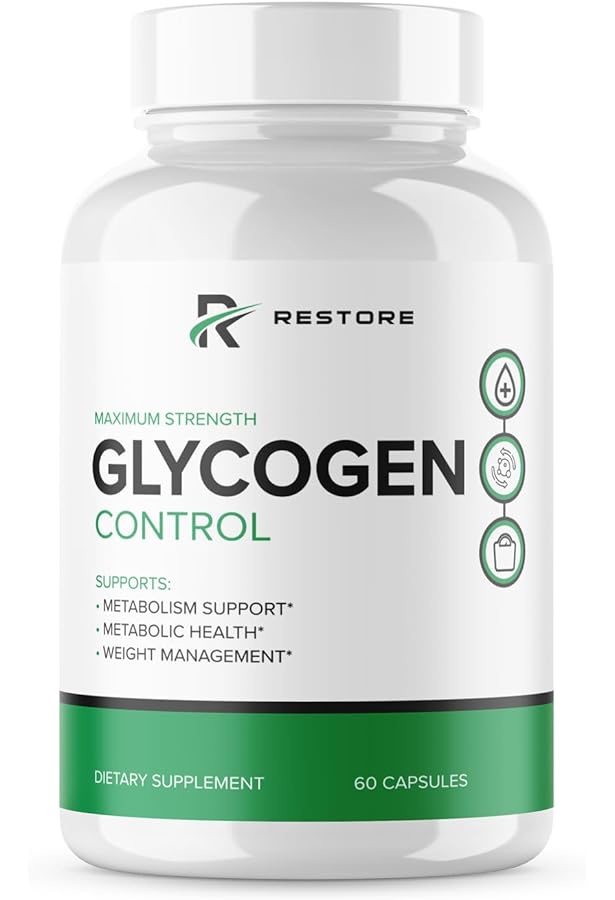Glycogen control plays a vital role in our overall health and well-being. It's a complex process that involves managing the storage and release of glycogen, a form of glucose that serves as the primary energy source for our bodies. From regulating blood sugar levels to fueling our muscles during exercise, glycogen control influences various aspects of our health and performance. In this blog post, we'll delve deep into the intricacies of glycogen control, exploring its significance, mechanisms, and practical strategies for optimizing it.
Understanding Glycogen:
Glycogen is a polysaccharide—a long chain of glucose molecules—that serves as a form of energy storage in animals and humans. It's primarily stored in the liver and muscles, where it acts as a readily available source of glucose when our bodies need energy. Think of glycogen as a fuel reserve that can be tapped into whenever the demand for energy arises.
The Importance of Glycogen Control:
Effective glycogen control is essential for maintaining stable blood sugar levels and sustaining energy levels throughout the day. When we consume carbohydrates, our bodies break them down into glucose, which can either be used immediately for energy or stored as glycogen for later use. Proper glycogen control ensures that glucose is efficiently stored and released as needed, preventing spikes and crashes in blood sugar levels.
Furthermore, glycogen plays a crucial role in supporting physical performance, especially during intense exercise. Muscles rely on glycogen as their primary fuel source during prolonged or high-intensity activities. Athletes and fitness enthusiasts, in particular, understand the importance of optimizing glycogen levels to enhance endurance and performance.
Glycogen Control Mechanisms
Several factors influence glycogen control, including dietary choices, physical activity, hormones, and metabolic processes. Here's a closer look at some of the key mechanisms involved:
- Insulin: Insulin, a hormone produced by the pancreas, plays a central role in glycogen control. After consuming carbohydrates, insulin helps facilitate the uptake of glucose into cells for energy production. It also promotes the storage of excess glucose as glycogen in the liver and muscles.
- Glucagon: Glucagon, another pancreatic hormone, acts in opposition to insulin. When blood sugar levels are low, glucagon signals the liver to break down glycogen into glucose and release it into the bloodstream, raising blood sugar levels and providing energy to the body.
- Exercise: Physical activity stimulates the breakdown of glycogen in muscles to provide energy for movement. Regular exercise helps improve glycogen storage capacity in muscles, allowing individuals to sustain higher levels of performance during workouts.
- Dietary Factors: The type and timing of carbohydrate intake can impact glycogen control. Consuming complex carbohydrates, such as whole grains and vegetables, provides a steady source of glucose for glycogen synthesis. Additionally, consuming carbohydrates before and after exercise can help replenish glycogen stores and support recovery.
Practical Strategies for Optimizing Glycogen Control:
Now that we understand the importance and mechanisms of glycogen control, let's explore some practical strategies for optimizing it:
- Balanced Diet: Focus on consuming a balanced diet that includes a variety of nutrient-dense foods, including carbohydrates, protein, and healthy fats. Aim to incorporate complex carbohydrates, such as whole grains, fruits, and vegetables, into your meals to support stable blood sugar levels and glycogen storage.
- Timing Carbohydrate Intake: Pay attention to the timing of your carbohydrate intake, especially around workouts. Consuming carbohydrates before exercise can provide fuel for your muscles, while consuming them after exercise can help replenish glycogen stores and support recovery.
- Regular Exercise: Engage in regular physical activity to improve glycogen storage capacity in your muscles and enhance overall metabolic health. Incorporate a mix of aerobic and strength-training exercises into your routine to maximize glycogen utilization and storage.
- Monitor Blood Sugar Levels: If you have diabetes or are at risk of developing insulin resistance, monitoring your blood sugar levels regularly can help you better understand how your body responds to food and exercise. Work with a healthcare professional to develop a personalized plan for managing your glycogen control.
- Stay Hydrated: Adequate hydration is essential for optimal glycogen metabolism and overall health. Drink plenty of water throughout the day, especially before, during, and after exercise, to support proper hydration and glycogen utilization.
Conclusion:
Mastering glycogen control is key to achieving optimal health and performance. By understanding the mechanisms involved and implementing practical strategies such as maintaining a balanced diet, timing carbohydrate intake, engaging in regular exercise, monitoring blood sugar levels, and staying hydrated, you can support your body's ability to efficiently store and utilize glycogen. Whether you're an athlete striving to improve performance or an individual seeking to enhance overall health, prioritizing glycogen control can have significant benefits for your well-being.
Official Website: - https://getsfreetrial.com/glycogen-control/
Direct Buy: - https://getsfreetrial.com/glycogencontrolgets
Tumblr: - https://www.tumblr.com/glycogen-control
Twitter: - https://twitter.com/glycogencontrol
Pinterest:- https://www.pinterest.com/supplementhealth02/glycogen-control/
Facebook:- https://www.facebook.com/glycogencontrolbuy/


No comments yet